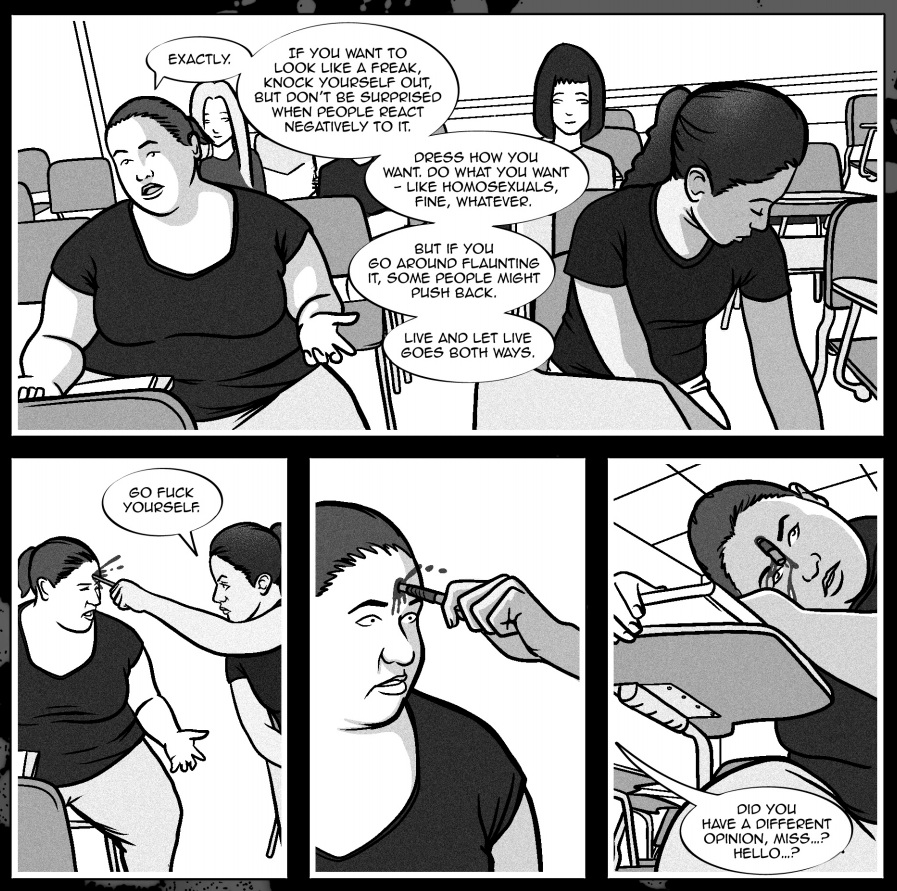Whatever my vote for comic of the year might have been worth in past years, it's probably lessened by the lack of blogging I've done this year. This year was the one in which I largely lost interest in American comics, to the point where I couldn't even get angry at the myriad stupid things that inevitably happen within the Marvel and DC Universes. But this was also the year in which creator-owned comics truly became a force in the industry, with countless great titles coming from smaller publishers without a franchised character in sight. Most of the comics I enjoyed were from Image, who got behind such great series as Saga, Sex Criminals, Elephantmen, Black Science, Velvet, Fatale, and most importantly, Voice in the Dark.
My vote for Voice in the Dark is partially based on the fact that its writer/artist, Larime Taylor, is disabled. I've spent a lot of time talking about disability within comic characters, but not nearly enough talking about disability within the comics' creators, who are obviously* far more important to the process. Since Larime Taylor has arthogryposis, he does not have the passing privilege that other disabled characters might use, and has been admirably frank in his criticisms of his difficulties getting around comic conventions. Even from a creative perspective this impacts his work, as he does his drawing with his mouth.
I'm trying to be very careful talking about Taylor's disability, because A.) I can only imagine as to what his life is actually like, and B.) I want to avoid the patronizing "inspiration porn" often used in describing disabled peoples' achievements. Voice in the Dark isn't good because it's by an artist who doesn't have the luxury of drawing it with his hands, though I also don't want to diminish the personal strength of character Larime shows to draw a monthly comic with his impairments. It's an admirable achievement, but that in and of itself doesn't make a good comic, and to focus solely on the author's personal handicaps ultimately diminishes their individual achievements (e.g. the condescending statement "It's good comic for an artist with...insert disability here...") No, Larime Taylor's Voice in the Dark is good because it's an objectively well-crafted comic that shows a natural grasp of characterization and visual storytelling that most cartoonists would need an entire lifetime of work to achieve.
For those who haven't read Voice in the Dark (which you should), this series chronicles the life of Zoey Aarons, a college freshman with serial killer impulses. Though it's not entirely clear how many people she's killed and under one circumstances (so far we know she killed a popular girl who romantically manipulated her sister, but Zoey's also an inherently unreliable narrator), she fights against violent, homicidal impulses that don't have a clear pathological origin. Zoey keeps this to herself for obvious reasons (including the fact that her beloved Uncle Zeke is a homicide detective), and she tries to help other people by running an anonymous radio show, where she encourages them to confess their own forbidden thoughts and feelings (while offering herself a place for "Dark Zoey" to safely speak).
Zoey is an inherently compelling character because, unlike Dexter Morgan (the most obvious comparison people have made regarding the sympathetic serial killer protagonist concept), she doesn't indulge her compulsion with an elaborate vigilante persona. She's mostly just trying to live her life, get through school, and not kill any more people. Repressing urges that society considers forbidden is something that everybody deals with, be it the urge to murder someone in cold blood or the urge to shout "This movie sucks and you suck for liking it" when watching Iron Man 3 in a theatre**. Zoey isn't devoid of empathy; far from it, as seen in the events of issue 2, when her advice to a suicidal caller is taken in a far less constructive way than she intended. Her experiences with her mental illness have made Zoey extremely contemplative and introspective for her age, and this definitely makes it harder for her to suffer the unwitting shallowness of her peers (though as far as we know, all she's done is fantasize about stabbing her roommates and classmates).
Even from two issues in, the characters are strongly defined and visually distinct. Despite being a grayscale comic without any fantastical elements, virtually everyone is recognizable as a unique character. Characters come from a variety of different cultural backgrounds within the Seattle, WA setting, and while you can understand why Zoey wants to kill some of them just for the sake of shutting up, nobody comes across as a one-dimensional stereotype. I definitely recognized some of the personality types from my own undergraduate experience (where I was similarly withdrawn and resentful thanks to my own illnesses, albeit not in a way that involved wanting others to bleed out), and the dialogue was realistic enough to make it a smooth read. This is a book that's mostly talking heads, but the character designs, expressions, and movements feel accurate and emotionally resonant.
This is a comic that virtually came out of nowhere*** and offered me a better reading experience than anything else I'd picked up in comic stores this year, and I strongly look forward to successive issues. In the end, if there's one thing I can say about Larime Taylor's Voice in the Dark, it's that you should buy it. Now.
* (Christian Weston Chandler of Sonichu fame doesn't count, as all he's created is a reason for aliens to destroy our planet, Alderaan-style).
** Thankfully I have a blog for that.
*** It didn't come out of nowhere in a literal sense, but it did come from a successful Kickstarter.




No comments:
Post a Comment